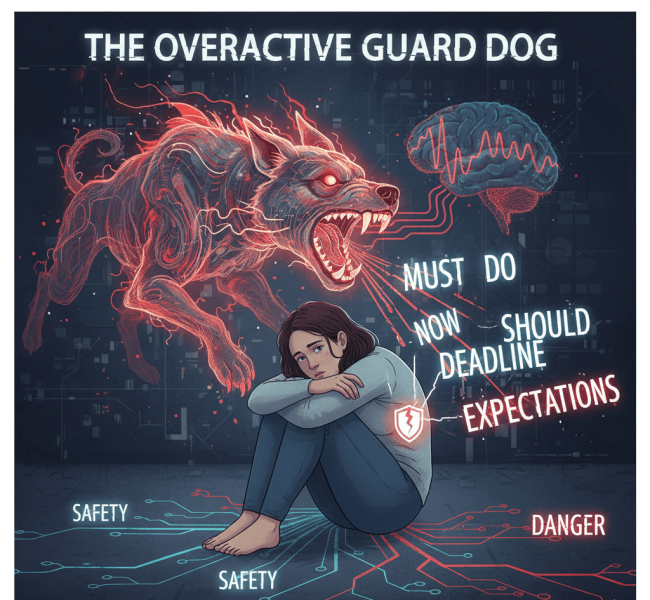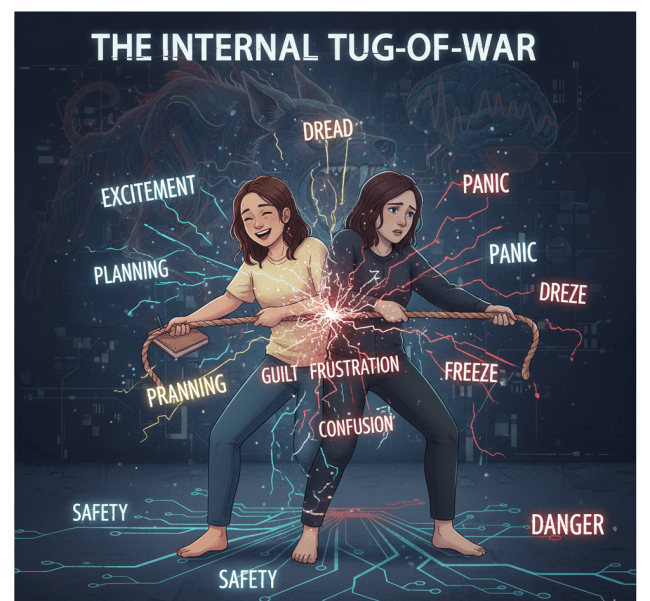Demand Avoidance in PDA
Why Do I Avoid Things I Actually Want to Do?
A neurodiversity-affirming look at demand avoidance in PDA
Have you ever looked forward to something, only to find yourself avoiding it when the time comes? Maybe you put off replying to a friend’s message, struggle to start a creative project, or cancel an outing you were genuinely excited about. If this sounds familiar, you’re not broken and you’re not alone.
This puzzling pattern is especially common for people with a PDA profile (Pathological Demand Avoidance), a form of autism characterized by a strong sensitivity to perceived demands. This avoidance is the result of how the nervous system responds to pressure rather than laziness, disinterest, or defiance.
Also Read: Could You Have PDA? The Surprising Symptoms You Might Be Missing
The Nervous System’s Role
For PDAers, demands can feel like threats, even when they come from within. The brain and body are constantly scanning for signals of safety and danger, like an overactive guard dog. When something registers as a demand, the nervous system may respond as though it is unsafe, triggering fight, flight, freeze, or shutdown.
Almost anything can feel like a demand:
- I need to send that email.
- I should go for a walk.
- I promised I’d do this, so I have to follow through.
- I’m in a situation where small talk is expected.
Even if you truly want the outcome, the moment it becomes an expectation, resistance often appears. Avoidance in this sense is a nervous system response designed to protect you.

The Internal Tug-of-War
Many PDAers describe feeling like two people at once: one who is eager to do the thing and one who shuts down or resists as soon as it becomes real. You might plan with excitement, only to feel dread or panic when it is time to act. That inner battle can create guilt and frustration, leaving you confused about why you seem to be standing in your own way.
From a PDA perspective, this is not sabotage but survival. The nervous system is saying, “If I do this—even if I want to—I might lose my sense of control.” For PDAers, autonomy is not a preference. It is a core need.

Reframing the Experience
The most effective response is not to push harder, add more pressure, or shame yourself into compliance. These approaches usually make avoidance worse. Instead, the path forward involves compassion and curiosity.
Consider asking yourself:
- What about this feels like a demand right now?
- How can I reframe this so it feels like a choice or invitation?
- Is there a way to bring flexibility, creativity, or playfulness into this task?
The aim is not to trick yourself but to create conditions where your nervous system feels safe. That might mean removing time pressure, breaking tasks into smaller parts, or approaching the activity in a way that emphasizes choice and autonomy. Some of the most creative ideas I’ve heard have involved imaginative ideas like pretending they are on a spaceship and the aliens are watching how they do daily tasks, or acting as if they are closing down a bar or restaurant in an exotic location. When it comes to what you imagine, the sky is the limit!
Also Read: All About Pathological Demand Avoidance (PDA)
You’re Not Alone
Many PDAers go years without understanding why they struggle to follow through on things that matter to them. Once they learn about demand avoidance, the pattern begins to make sense, and much of the unnecessary self-blame can fall away.
You deserve support that respects how your nervous system works. By approaching yourself with understanding and flexibility, you can begin to work with your nervous system rather than against it. This shift allows you to move toward the things you want on terms that feel safe and sustainable.
If you are curious about whether you or your loved one meets the PDA profile, we would love to help! Reach out if you want to learn more about an evaluation.
Dr. Jessica Myszak, Dr. Jaime Long, and Dr. Aimee Rovane have significant experience performing psychological evaluations with children and adults. They offer both in-person and telehealth evaluations for children, teens, and adults looking for answers. In addition to seeing clients on the Chicago North Shore, they are able to work with families who reside in Alabama, Arizona, Arkansas, Colorado, Connecticut, Delaware, Florida, Georgia, Idaho, Illinois, Indiana, Kansas, Kentucky, Maine, Maryland, Massachusetts, Michigan, Minnesota, Missouri, Nebraska, Nevada, New Hampshire, New Jersey, New York, North Carolina, Ohio, Oklahoma, Pennsylvania, Tennessee, Texas, Utah, Virginia, Washington, Washington DC, West Virginia, Wisconsin, and Wyoming! If you are interested in learning more about potentially working with them, you can visit their website here to get the process started.

